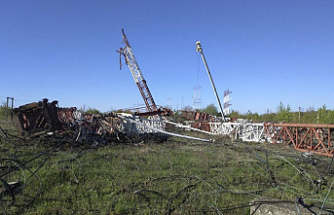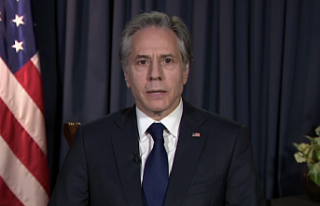-
Sergey Lavrov (Russian Foreign Minister) stated on January 28 that "We don't want wars." On February 25, he added, "Nobody is going attack the Ukrainian people... There are no strikes against civilian infrastructure."
-
Sergei Ryabkov (Deputy Foreign Minister), January 10, 2012: "We don't have any plans or intentions to attack Ukraine."
-
Vasily Nebenzya (Russian Ambassador to the United Nations) stated that there is a lot fake news out there and that fake factories are producing those news.
-
Vladimir Putin, Russian President, stated on February 15, that he wanted war or peace. No.
They lied.
Nobody can predict what the future holds. Ted Koppel, a senior contributor to "Sunday Morning", turned to four experts whose lives and expertise give their opinions special weight.
Nina Khrushcheva is the great-granddaughter and great-granddaughter Nikita Khrushcheva. She came to America in the Soviet Union. Although she is now a professor at the New School, New York, she still maintains close ties with the country where her mother was born.
Koppel was told by her that people are being fired because they speak against war. "My niece was just arrested in Moscow. She was walking. Because she was young, the police assumed she must have been protesting against war. She would be arrested."
Khrushcheva pointed out that Putin's poll numbers are up from 60% to 71%.
"Now, can those polls be trusted?" asked Koppel. Koppel asked, "Or does it the Kremlin ..."?"
"Oh yes. It's not the Kremlin. It's the Levada Poll.
"But I think when the bodies return, it will be in the dark of the night and there won’t be anyone there to photograph it?"
"Absolutely," Khrushcheva replied. "And they already, I'm referring to the fact that there is already information that they are burning those bodies. It's a Stalinesque time, right now.
When he headed the National Security Agency, Keith Alexander was a four star general. Alexander is the only American who knows more about cyber warfare and Vladimir Putin's retaliation. He is not making the progress that he expected. He'll turn to cyber, I think.
"I believe that he's going to hit Europe and the United States using that cyber. These attacks will be spread across the entire spectrum, I am certain.
Koppel asked: "Can it be put in terms of the average citizen's experience?"
Alexander stated that "the average person will look at what's going on to their bank, their power company, their credit cards, or the distribution and goods of goods, oil and gas, or supplies to their shops." Cyberattacks could impact all of this.
Fiona Hill was a senior director for Russia and Europe at the Trump White House. Her memoir, "There is Nothing for You Here," has just been published.
Hill stated, "Modern war is not about territorial conquest. It can be hybrid war, information warfare, influence operations and propaganda. You can also use criminal groups.
Fiona said, "In a certain sense, Fiona. You're saying we are already involved in World War III?" Koppel asked.
"Exactly. Many American families, especially those in the middle, have sent their children to war zones like Afghanistan, Iraq and Syria. It's going to be necessary for us all to consider that we are all part of this. It's not enough to think about, it's also the families of Americans who have been deployed overseas or who have been in danger. It could be us all right now.
Leon Panetta, who was once Chairman of House Budget Committee, White House Chief Of Staff, Secretary to Defense, CIA Director, and one the earliest warning voices about the dangers of cyberwarfare, is hard to imagine anyone with more experience in government. Cyber is a weapon of warfare today. It can also be used to paralyze another nation, which is undisputed."
Koppel asked: "When Vladimir Putin warns about consequences 'the unlikes of which the planet has never seen before', everybody assumes he is talking about nuclear war. Could he be referring to cyber warfare?
Panetta responded, "I don’t think there’s any doubt he could have been talking about cyber warfare." Cyber warfare doesn't require you to have an air force or ground troops. It is possible to simply sit down at a computer, and create a sophisticated virus that can destroy our electrical grid, our financial systems, government systems, and our banking systems.
The President Joe Biden repeatedly stressed that no U.S. troops would be sent to Ukraine. However, he also warned Putin not to attack any of the NATO 30 member nations. Mr. Biden stated in his State of the Union speech that the United States and its Allies would defend all of NATO territory with the full force of their collective power.
Koppel asked: "What's being proposed right now? This is not theoretical. It could be next week, or next month. That Vladimir Putin orders Russian troops to one of these Baltic States. To respond, are we willing to risk nuclear war?
Panetta stated, "It's dangerous moment; nobody could deny that." Panetta said, "We are dealing with someone who might very well resort or worse to any kind of nuclear weapon." We have drawn a line and I believe if we don't stick to that line it will severely undermine our credibility before the world and ourselves."
Hill stated that Putin wants us to believe and think because he has made it clear that the nuclear option is available. Because he's put his nuclear forces in high alert. He wants us to know that his thoughts are about ours. One thing about Vladimir Putin is that if he had an instrument, regardless of how terrifying, unusual, or cruel, he wants us all to believe that he would use it.
"So, we must address this issue seriously, and not be intimidated ('cause he's exactly what it is), and not to be scared or to fall back."
Khrushcheva stated, "My fear it that he's willing to go as far he needs to." It should exclude NATO countries. We can't exclude this possibility at the moment."
"And that would imply that we are on the brink nuclear war?" asked Koppel.
It will indicate that we are at the exact World War III we have been avoiding for three months. It's also a sign he's actually playing. He may be playing, but it's very possible that he is playing dangerously.
Alexander stated, "If he uses nuclear weapons, then I believe that's the end to his regime." He seems to understand that. He will threaten us with nuclear weapons, which I think is the only alternative. He will resort to cyber. Both of these areas are going to be pushed back by us, I believe. We have the capability to do the exact same thing against him. My belief is that ours will be more focused on him than the Russian people.
Koppel asked: "The Russian people are used to suffering pain. The American people are, quite frankly, not used to suffering pain. The Russians have been doing this for years, in cyber attacks that deprive us of the things we need to live our lives. We have become accustomed to getting what we want, when we want it.
"Yeah. Alexander stated, "So, you make a great point." And what you have to say is logical. What happens when this is disturbed? It's almost like World War II. I think we'll grumble. I believe it will awaken the American people and they'll shout, "This must stop!" It's hard to predict where it will lead. "I have great faith in the American people's will to persevere when it gets hard."












